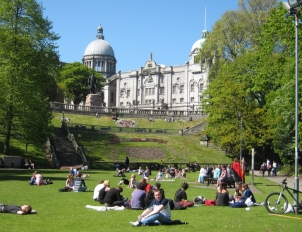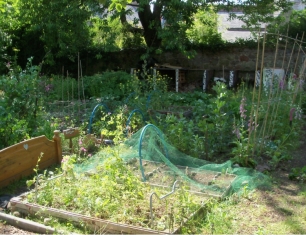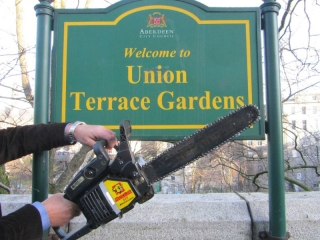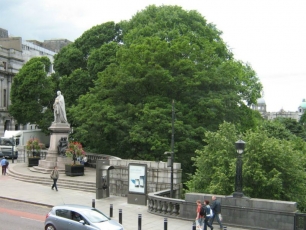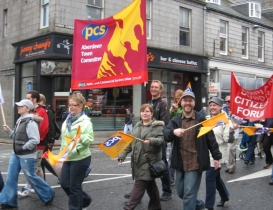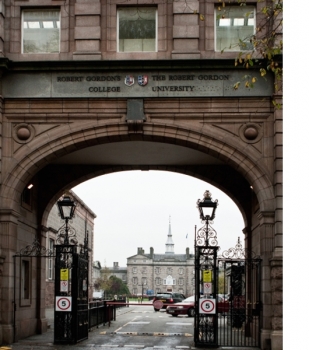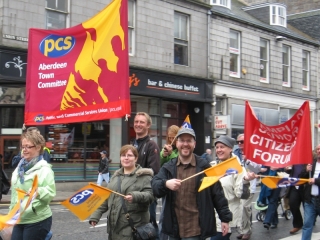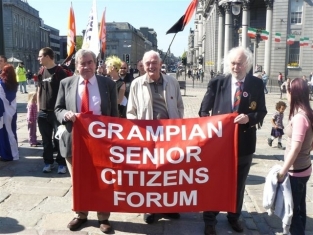Voice’s Old Susannah takes a look over the past week’s events in the ‘Deen and beyond. By Suzanne Kelly.
 Season’s Greetings! No doubt you’ve bought your presents, decked your halls with boughs of holly, sent all your Christmas cards, planned your Boxing Day television viewing, and ordered your turkey.
Season’s Greetings! No doubt you’ve bought your presents, decked your halls with boughs of holly, sent all your Christmas cards, planned your Boxing Day television viewing, and ordered your turkey.
The holidays are upon us, the pre- pre-Christmas Black Friday sales have turned to pre-Christmas sales which will in turn morph into Boxing Day sales. Hoards of shoppers will claw and elbow each other to get the last Size 14 Per Una black lace dress or the last Barbie’s Dream House from the shelf, all in the spirit of the season of good will.
Happy bargain hunting. No need then for any further lines from me on the true meaning of Christmas.
Of course there are local shops with handmade / unique / different gifts that could be bought to support local traders, but then again, selecting gifts from ma and pa shops requires a bit more time, thought, and sometimes a bit more money.
If you ever worry about who’s made the trainers or clothes you’ve just bought (or how animals were treated in the process), I wouldn’t bother. No less than an RGU lecturer I had some years back explained to his eager class how much better off third world workers are now.
In the old days, they would work for free. Now they can live and work in factory dormitories miles from their families 24/7 and earn a pound or two a week – which is more money than they were used to. Result!
This particular lecturer’s idea seemed to be that this is progress, and we’re doing our bit to help the third world. I was pretty much the only person in the class who asked the question ‘but what about ethics’? It’s best not to question people in a position of power (a lesson that is somewhat lost on me), and much better still to agree with them completely if they have the power of giving you a good grade.
If you’re lucky enough to get rewarded for putting your principles aside during these ‘Business 101’ type lectures from an early age, pretty soon you’ll have lots of good grades, and you won’t be troubled by any nagging doubts about what’s right and wrong, making it easier for those in power to get you to agree to more and more business-friendly, ethic-free dogma.
You’re not allowed to make fois gras in the UK for cruelty reasons
Anyway, back to your Christmas shopping. If your fur trimmed coat was made from cats and dogs kept in unspeakable conditions and skinned alive by veritable slave workers, or if the fur was pulled from a suffering rabbit to make you a nice pink sweater, well, you’re just helping to create a more competitive, capitalist world.
Well done you. (At least I didn’t mention fois gras production. But since you ask)
Fois Gras is produced by force-feeding mature male geese by shoving tubes filled with food down their throats as they spend their last weeks in tiny cages so they can’t even stretch their wings, let alone fly. Their livers and stomachs sometimes burst; they are traumatised beyond words.
You’re not allowed to make fois gras in the UK for cruelty reasons, which is bad for capitalism. Still, a few places still persist in importing the stuff and tout it to the would-be elite.
While you put your presents under the tree, none of which were probably made in the UK let alone locally, you might do well to wonder if there is some connection to you buying £4 jeans and the guy next door losing his job to a foreign company that can produce goods cheaper. It’s almost as if there was a connection of some sort.
The question of ethical goods, working conditions and animal treatment are, of course, the sort of spurious concerns of those who would slow the free market economy. As mentioned, an RGU professor was keen to tell his students how buying cheap Chinese goods was canny, and ethics had nothing to do with it.
Old Susannah recently had a conversation with someone about our entrepreneurial hero, Donald Trump.
I wanted to make sure the business woman in question knew about a few minor details which unfairly make The Don look a bit tarnished. There is the BBC proving his links in the US to organised crime figures. There are the lawsuits, the investors who have lost millions, and of course the small matter of the Trump University leading to charges of racketeering against DT.
The Trumps of this world don’t get where they are just on their good looks alone
I was wondering whether local companies might not look good allying themselves to the Trump course or hotel, if they wanted to stay free of any association to what unkind people are calling sleaze and corruption.
The shocked reaction I got from this woman was:
“well, that’s just how business works. I’ve had to do many things that were not strictly speaking legal, but that’s just how it is”
I wonder if she’d had the same RGU lecturer as I had?
There are those who think that corruption only applies to cases where envelopes of unmarked bills are changing hands. That kind of corruption is largely a thing of the past, except of course in cricket and football. There are far more subtle, inventive ways to operate.
So, is it OK to bend the rules, ignore dishonesty, engage in a bit of friendly racketeering or animal cruelty if there is money to be made? Absolutely. The Trumps of this world don’t get where they are just on their good looks alone. And so, to help the budding entrepreneur, shopper, or business student, here are a few definitions from Christmases past, present and yet to come.
Cronyism: (Eng. Noun) To show favouritism based on relationships such as family, friends, work colleagues.
Cronyism charges were levelled against the BBC; the National Audit Office believes something may be amiss with some of its latest payouts to the most senior departing BEEB execs.
Some of these poor overworked execs have had a tough time; one only lasting a matter of months before going. As you pay your licence fee this month, you might be forgiven for wondering how much of it is going on the £25 million or so in payouts for 150 leaving executives.
Some people were given more than their contracts said they should receive by their colleagues, but that is probably just generosity, not cronyism. Oddly, former Barclays bank supremo Marcus Agius came into the spotlight as well for his role within the BBC doling out taxpayers money.
I guess banks are used to doing what they wish with public funds, since we decided to give them all of our money not so long ago, and that was money well spent.
Obviously this cronyism thing is something that only goes on with left-wing media types
Former BBC deputy director Mark Byford was so traumatised by leaving that he had to be given a token sum of £300k to keep him ‘fully focused’ on his work before he left; his package was worth a million or so. What a brave guy to soldier on.
The Times reports on 16/12 that ‘BBC executives were paid millions of pounds in ‘sweeteners’ because of leadership failures at the highest level and a culture of cronyism’. Well, if friends can’t help each other, what are they for?
Obviously this cronyism thing is something that only goes on with left-wing media types. Thankfully here in the Deen we have the well-balanced ACSEF to be our business and moral compass.
For instance, I’m sure all the work it did to promote the granite web, spending hundreds of thousands of taxpayer pounds in the process, were committed only after completely fair, anonymous tendering processes had taken place, even if they channelled many of the invoices through the Chamber of Commerce which refuses to let us know who did the well-paid work.
It’s not as if, say, a PR company that had ACSEF presence and clients interested in the web going forward would just be given work by ACSEF without any full tender process.
It’s not as if disgraced ex-policeman Ian Paterson was known as ‘patting Patterson’ in the circles he moved in without anyone doing anything to dissuade their colleague from his inappropriate behaviour.
In the bigger Scottish picture, it’s not as if a friendship with the First Ministers past or present would lead to any favouritism. Where would we be, for instance, if the rich and powerful could just befriend and dine with our ministers, and get a little help with planning permission, or get appointments to government posts?
Thank goodness for our transparent, fair, unbiased government on the local and national stages, without a whiff of cronyism.
Amnesia: (Eng. noun) A form of illness, causing temporary or permanent loss of short- and/or long-term memory.
Police Scotland are suffering from a bout of amnesia; they can’t remember where they left a report they wrote on the City Council’s interesting finances.
The police surely didn’t find anything criminal going on
Back in 2008, Audit Scotland looked at how our then city administration seemed unable to make any profit out of selling real estate; we the taxpayer lost out on a few million pounds here and there as Kate Dean and Co. approved sales of land / buildings for a fraction of their real value.
Then Chief Executive Paterson (not to be confused with ex, disgraced policeman Patting Paterson, who is now convicted of sex offences) vowed he would not to resign over the property sales crisis. The next week he suffered a bout of amnesia, and promptly resigned, taking with him only a modest home in Ferryhill, which the city, apparently, sold to him for less than market value.
At least they were consistent.
Audit Scotland investigated, but could not decide if it was incompetence or criminality at work as deal after deal involving the same people (cronyism?) lost thousands upon thousands.
They turned the matter over to the police to investigate, and very little was ever said on the matter again. The police surely didn’t find anything criminal going on (cronyism?) or they would have arrested some of the city mandarins that they would have known from being on different committees and working groups with.
And in a classic case of amnesia, only a few years later, the police can’t find any record of the report they created. Or so they told me.
No wonder the police found no wrong doing. They can’t even find the report.
They might have the prints and DNA of children, people accused but acquitted of crimes, a few dangerous journalists such as Anthony Baxter and Richard Phinney (creators of ‘You’ve Been Trumped’) on file forever; but they cannot find a report into city council transactions worth millions of pounds.
Old Susannah isn’t getting any younger, and can be forgetful sometimes, too. But I have this ingenious method of looking for documents I’ve created on my computer: It’s called ‘search’. If I type details of information I’m looking for from anything I wrote, the computer finds it for me in moments.
The Royal Bank of Scotland has been found guilty of turning healthy businesses into bankruptcies
I wonder if the police are clued up to this amazing way to look for infomation? Are they still writing their reports on vellum with ink? I can even look for items in my email, and some of you out there may be aware of this amazing technological development from the 1980s, too.
So, corruption according to some is only when you have envelopes of money flying around; I guess a little amnesia, washing of hands, selling taxpayer property for less than the real value, be it Aberdeen land or the Royal Mail, can’t be corrupt then. Anyway, I’m sure it’s just one of those things, and no cause for concern.
Words such as ‘scandal,’ ‘coverup’ and incompetence would never occur to me when I think of how the former council sold land. But still, I wonder what the market value was of the house Doug ‘I will not resign over this’ Paterson bought from us when he retired, after presiding over these little property sales.
Fraud: (English noun) The act of committing dishonest acts for personal gain
With professors, like my old RGU don, striving to indoctrinate young (and in this case old) minds that all’s fair in business, perhaps it’s no wonder we have one or two instances of fraud around us locally and nationally.
From Carly Fallon passing off other people’s writing as her own, to restaurants offering bribes to those who give them good Trip Advisor write-ups (you know who you are), from companies using offshore tax dodges, fraud is definitely the new rock and roll.
The Royal Bank of Scotland has been found guilty of turning healthy businesses into bankruptcies, and then magically buying such businesses for a pittance and making profit, while the original owners have lost everything. Again, all’s fair in love, war and business.
More on Christmas next week, but if Father Christmas is making a list of who’s naughty or nice, one or two people in Aberdeen may find themselves on the naughty list.
Right, well it’s Christmas again.
I think by now we’ve established that not everyone looks like a supermodel, can afford hundreds of pounds of food and presents, and not everyone will be having dozens of close, equally-beautiful friends dashing to their homes in open sleighs to sing around 12’ tall, perfectly decked trees.
Don’t buy into a picture that doesn’t exist. But do, if you’re feeling stressed or unhappy about anything at all at this time of year, talk to a friend.
If you can’t talk to a friend or a family member, talk to one of the many services out there that will listen to you without judging you. Stress is particularly bad for people at this time of year, and it’s important to remember that worrying about things outside of your control will never solve anything, but will make you anxious or ill.
If there are things you can change and want to change about your work, life, home, then stop, figure out what you need to do, and start to make a plan for change. Don’t let your problems grow out of all proportion.
If you need a little bit of perspective, do some volunteering, fund-raising, join a group – do something new. You’ll be glad you did. There are people out there far worse off than you or I; be glad for what you’ve got, and don’t be tricked into thinking you need more material things to keep up with some imaginary Jones.
Sorry if this all sounds a bit obvious/preachy/oversimplified – but at the end of the day, it is definitely within your power to take stock, realise what you do have to be thankful for, and to fix what needs fixing. Please be happy, be safe, and have a Happy Christmas or whatever you might be celebrating. – OS
- Comments enabled – see comments box below. Note, all comments will be moderated.
 With thanks to Aberdeen/Shire Greens.
With thanks to Aberdeen/Shire Greens.

